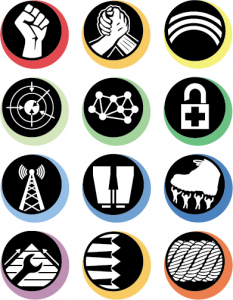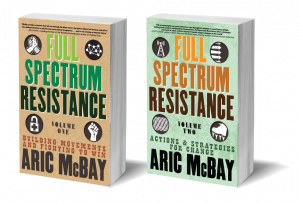“I know the one thing we did right / was the day we started to fight.”
—Keep Your Eyes on the Prize, civil rights anthem
“We are never assured of justice without a fight.”
—Angela Davis
I wrote this book because we are losing. The global exploitation of the poor is accelerating even as the rich grow wealthier than at any point in history. The fertile planet that keeps us all alive is being poisoned, baked, and stripped bare. Remaining Indigenous and traditional people continue to be attacked and pushed off their lands so that the rich can exploit resources that will be exhausted in a few decades anyway. We are losing and we need to learn how to win, fast.
I’ve been a social and ecological justice activist for two decades. In that time, I’ve worked on waste reduction and recycling projects, organized with anti-poverty community groups, and marched (or sat in jail) at summit protests. I’ve helped start a community garden and organic farming operations. I’ve written four books, and given speeches to both academics and angry crowds. I’ve been a union organizer and a farm organizer. I’ve worked with militant conservation groups using direct confrontation and civil disobedience. I’ve developed a broad perspective on political action that comes from using many different tactics in many different campaigns.
But the truth is that in almost every campaign I have worked on in my life, we have lost ground. In ecological campaigns like forest defense, that’s been literally true. In anti-poverty campaigns, it’s reflected in the ever-growing gap between rich and poor. This is not only my experience, but the experience of many activists working on many different issues. In areas where I do feel like progress has been made—say, queer rights—there is a constant threat of backlash and backsliding. The gains we have won rest on a temporary and unstable foundation; we cannot expect to win long-term human rights from a society that is based on flagrant ecological unsustainability.
If we want to reverse this tide of losses, we must speak honestly to each other about the situation we are in, and about its severity. We must speak about why we have been losing and what that means for the future.
This book is about what makes for effective action. It is about how to organize effective resistance movements. If we want to make social change and defend a habitable biosphere, we must unflinchingly examine those tendencies (especially those on the left) that have made us ineffective. I will dissect some of these pernicious predispositions in the pages to come.
Some of these barriers to action are misconceptions about how power works in society. The left in general has been naïve about the effectiveness of “moral suasion.”1 Too many people have clung to the faith in government that “good citizens” are supposed to have. We often work under the assumption that those in power will be convinced to stop their atrocities if we offer them a good example or a well-reasoned argument.
Historically, this is nearly unheard of.
The unfortunate reality is that most people in power—whether in political office or a corporate boardroom—benefit greatly from their status and have been trained not to question the power structures that put them there. Further, when we try to make social change we rarely deal with thinking and compassionate individuals who can be persuaded by moral example. We deal with large, abstract social machines: corporations and corporate-structured governments. You can’t persuade a machine. In the social machine of the profitable corporation, the anomalously compassionate individual is merely a defective component to be replaced by the bosses or shareholders.
We have failed to think and act strategically. We’ve based so many of our campaigns on the idea that those in power will stop exploiting people and destroying the planet if only they can be educated out of a few minor mistakes. This is a comforting myth for those who might otherwise feel powerless. But it is a myth we cannot afford to cling to any longer. By allowing those in power to determine the agenda and the timetable for change we have given up the initiative, and we have failed to develop appropriate strategy ourselves.
We need resistance movements. If we want to become effective at combating runaway climate change and countless other injustices, thinking people on the left must stop acting like “the loyal opposition” and start acting like a real resistance force. We have to learn from the strategies and resistance movements of the past.


